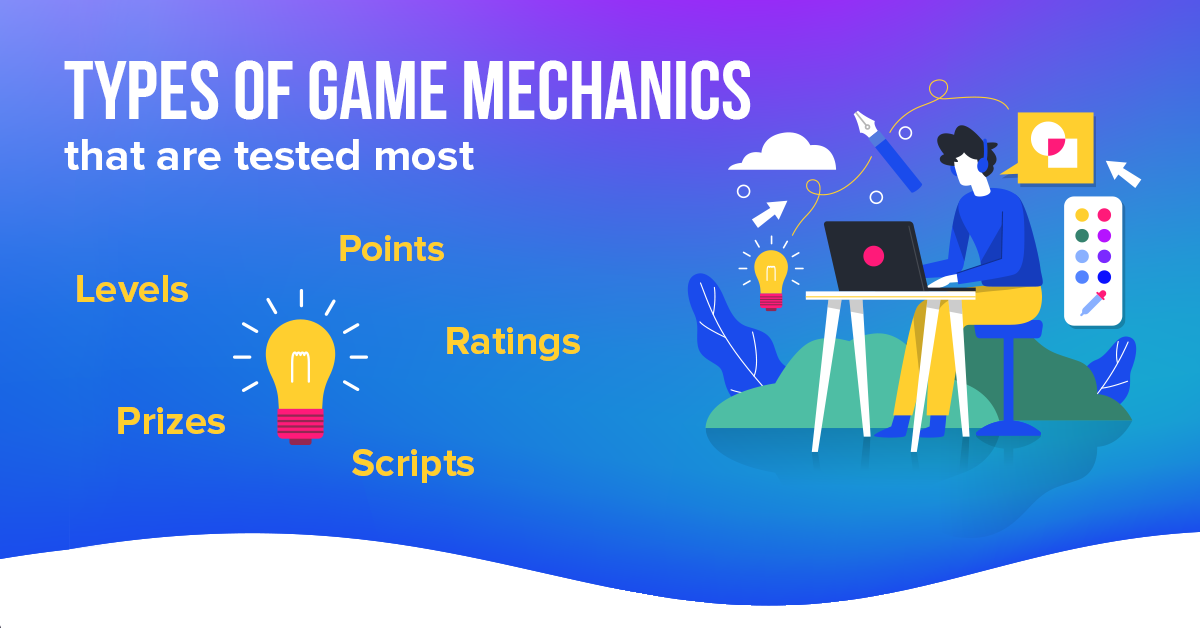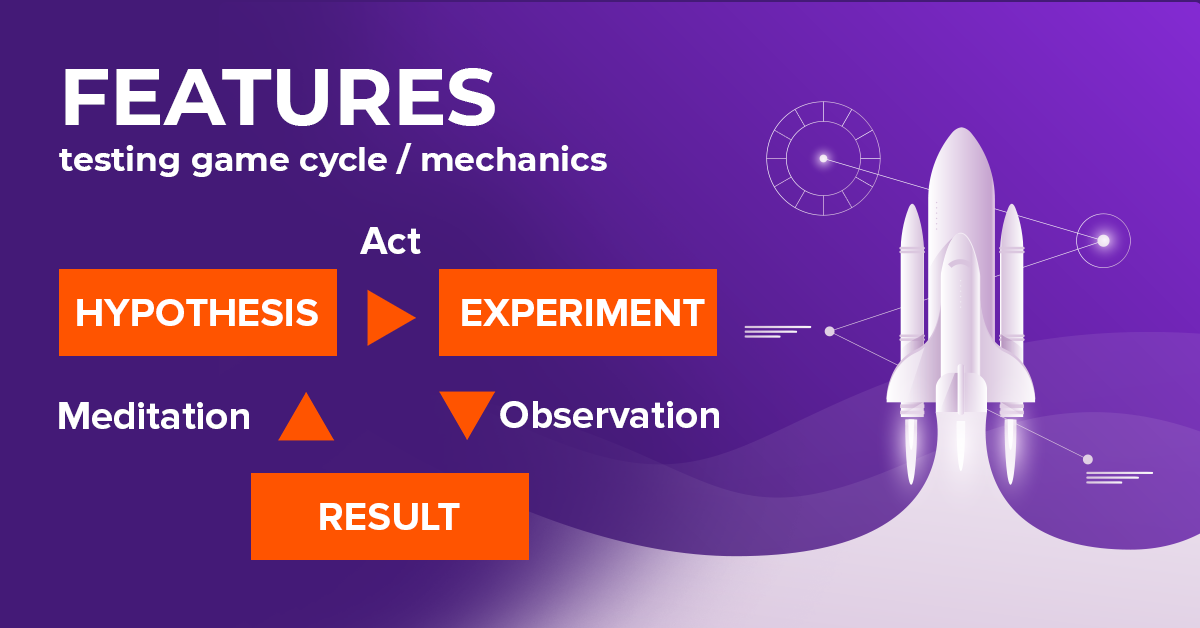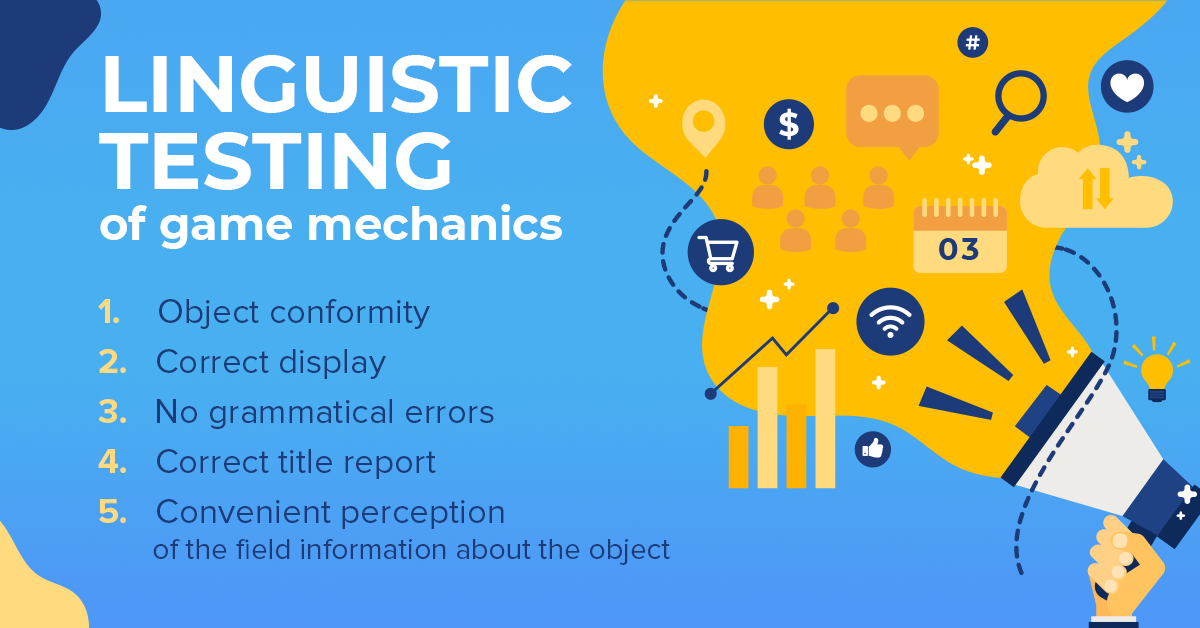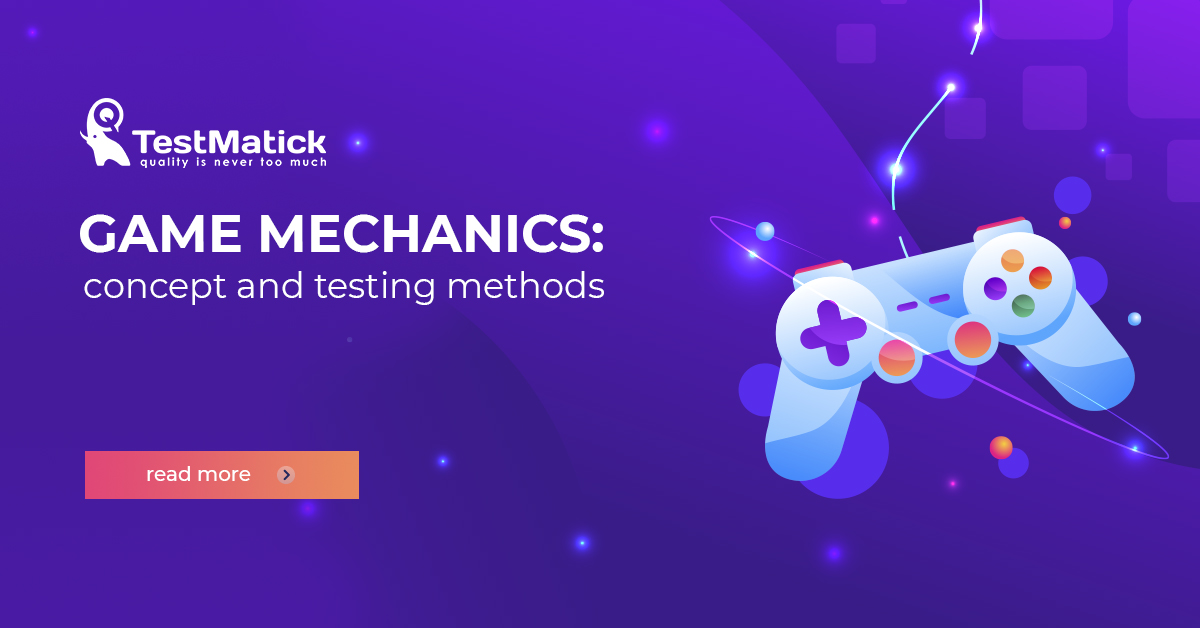Today in the big and constantly developed world of web technologies there’s a huge number of games. Unfortunately, the last tendencies in this field show the lack of really original and dissimilar games.
The undertaken race for a customer spins up more and more with each passing year, and game developers face the task – to create the product which can attract and retain a maximum number of users.
One of the fundamental things in any game is a game mechanic. It’s the task of game modules and components set to make the game very interesting to the user.
Game testing is a more complicated process than testing of non-game applications since often games have complex game mechanics.
Game mechanic – is a special combination of rules and symbols, which tells how something works and in what order.After the successful accomplishment of A, B will be definitely realized. If the A is correct, the condition B can be fulfilled. In other words, a game mechanic is a set of rules, which applies to players, game processes, game condition and which simply describes all variations of game state modification.
Obviously, different games have different mechanics. But you shouldn’t underestimate the fact, that the same group of mechanics can be actual for some group of similar games. Particularly, it concerns to dividing by genres and kinds.
For example, all RPG must be supplied with all basic mechanics, without which they simply couldn’t belong to this particular game genre. The same conception is actual for shooters, RTS and other kinds of games. But it’s worth to say, sometimes there’re real “nuggets” which can in a flash change conventional image about the specificity of one or another genre.
Further, in the article, we’ll present the most popular game mechanics, which can be used in most modern games.

Types of game mechanics that are tested the most
Kinds of Game Mechanics
Achievement
Concept: virtual or real implementation of some accomplishment. Traditionally, they are considered as getting a reward for some actions.
Example: achievements, points, in the game meaning – everything that can be regarded as a reward.
Appointment Dynamic
Concept: dynamic; where if you want to reach success, you should return to some moment and do certain actions.
Example: after returning to the game at some moment, the player gets a set of some “neat features”.
Avoidance
Concept: it’s a condition when a player acts in order not to get a special reward, but to avoid potential punishment. It can cause a number of manipulations, which are synchronized by the game system.
Example: pressing a lever, in order to go up to the next floor in the building.
Behavioral Contrast
Concept: it’s a special theory, which shows how the player’s behavior can change according to change of expectation.
Example: if the player passes the level, he/she gets 100 points of experience for the first time. With the next completing of all tasks, he/she gets 200. After doing this task for the 10th time – only 50 points. As a result, probably, the player won’t do the same task many times.
Behavioral Momentum
Concept: trend in player’s behavior to the constant continuous doing of some actions, he/she faced previously.
Example: a good example of this mechanic can be a farm or grind in different games, i.e. constant doing of the same things, in order to get the desired reward or some result coming.
Blissful Productivity
Concept: the logic is that playing a game and dealing with hard tasks, the user feels some special happiness, different from that he/she feels while resting or relaxing.
Example: playing for 6 hours on the hard level, you’ll consequently get more than you could get, playing on the easy level.
Cascading Information Theory
Concept: this theory says that for some level of understanding the game, data must be given in a minimum filled components.
Example: giving the plot’s description in the game. Only tutorials.
Chain Schedules
Concept: the logic of connecting the rewarding process with some series of unexpectable situations. Users tend to consider this as individual processes. Reaching one step in the chain of sequential activities is regarded as a separate reward.
Example: to kill 10 players, in order to get to a needed location where one can find useful “neat features”.
Companion Gaming
Concept: companion gamе is a special game which can be played by a number of users on different operating platforms at the same time.
Example: popular games on iPhone, Facebook, Xbox with a seamless cross-platform game plot.
Contingency
Concept: an error, which a player should deal with in a tripartite graphic paradigm of bonuses and other “neat features”.
Example: 10 orks-killers appeared on the way of the virtual warrior.
Countdown
Concept: a special game mechanic, when a virtual player has limited time to do some actions. There’s activation of his/her activity diagram, with the help of which the first player’s activity becomes more dramatic until the time is up and the mode is forcibly completed.
Example: virtual games with a timer to get maximum scores and rewards. Time-pass games. Variations of game logic with the extreme timeline (to get to the cave till night coming, etc.).
Disincentives
Concept: some game element, which uses a fine in order to cause behavioral changes.
Example: lose of hp health, quickly appearing traps.
Endless Games
Concept: all virtual games, that don’t have any end in their logic. A lot of apps and casual games with constantly updated content, where a static condition in itself is a reward.
Example: different casual jumpers and runners, series of MMO games.
Extinctions
Concept: extinction – is a concept, used for a detailed description of ending the process of rewarding the player. Traditionally, it leads to players’ anger, who feel completely deceived. As a rule, such a mechanic causes a negative behavioral impulse in the human.
Example: by analogy with behavioral contrast, but now the user doesn’t have any experience.
Fixed ratio rewards schedule
Concept: a game mode of fixed virtual relationship, which supposes getting a reward by a player after doing some actions.
Example: in order to do a quest’s task, you need to kill a dragon or find a princess.
Interval reward schedules
Concept: a virtual mode of interval rewards, which allows the user to get some bonuses after a while. There’re two types of it: variable and stable.
Example: wait for n minutes to collect payment for staying at the hotel.
Lottery
Concept: a virtual game dynamic, when the winner is chosen randomly.
Example: a huge number of gambling games and quick lotteries.
Modifiers
Concept: a set of special facilities, which influence other actions while using them. Traditionally, modifiers are created by doing some tasks or basic responsibilities.
Example: modifier of x2 type; with its help, you can double your scores, that you got after doing some actions.
Privacy
Concept: some part of game data is confidential information, which shouldn’t be on public access.
Example: publicity about the user’s location every time, when he/she does some actions.
Progression dynamic
Concept: a game dynamic when game success is shown and valued while doing clear stated tasks.
Example: different indicators, a growth of the users level from 1 to 100, progress bars.
Ratio Reward schedules
Concept: the game ratio of rewards gives the user some reward after doing some actions. There’re two kinds: stable and variable.
Example: to kill 2 dragons and get new skills.
Real-time v. Delayed Mechanics
Concept: data, coming in real time, game freedom from latencies. Data with delay come exactly after a while.
Example: total score, that’s updated in real time, causing the immediate user reaction (delight or disappointment). Delay brings some ambiguity, which can provoke a high activity because of the complete absence of clearness in the arrangement of virtual powers.
Reinforce
Concept: game reward which player gets in case of doing expected action in the tripartite paradigm of reward mode.
Example: getting a new game level after killing 10 enemies.
Rolling physical goods
Concept: physical benefit (which has totally real value in life) can be got by some player on a regular basis if somebody reaches certain specifics or game achievements.
Example: to be the first one in something.
Status
Concept: level or player’s abilities. Most players are motivated by a strong desire to reach a higher level or game status.
Example: game warrior with fully advanced game equipment.
Variable interval reward schedules
Concept: a special variable interval game reward mode, that allows getting a reward after some periods of time.
Example: waiting for 30 min and the player gets a weapon.
Fun once, fun always
Concept: a theory, that some action brings maximum pleasure, no matter how many times it was. It’s intended the simplest examples of game activity.
Example: different tasks to explore a virtual place.
Virtual items
Concept: digital rewards, prizes, artifacts which were found during the game. They can be easily sold or changed for something.
Example: equipment in RPG, various gifts on Facebook.
As for special aspects of game mechanics testing, here the things are much easier than it seems on the face of it, but there’re some pitfalls too. Firstly, you need to choose what game mechanic should be tested. It’s very important to understand WHAT exactly to test, and then HOW it should be checked.

Features testing game cycle or mechanics
After you specify a game mechanic and its components, you need to start building a serial string of tests, which will affect all aspects of this mechanic. Don’t forget about adding the tests of the interaction between different mechanics. Also, you need to work on all possible variations of interaction between future user and mechanic, as well as to determinate the influence of such mechanic with all game process.
Also, you shouldn’t forget about linguistic aspect of any test.

Linguistic testing of game mechanics
Conclusion
Game mechanics – are an important part of a game organism. Any organ can’t function separately, but along with others, it builds a whole complex of life’s activity, where it sometimes plays its original integral role.
The game testing company can provide you with holistic game mechanics testing services on various platforms and make a detailed analysis of how these mechanics affect gameplay and player experiences.










Leave A Comment